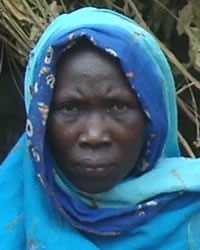Jumjum in South Sudan

Photo Source:
Anonymous
|
Send Joshua Project a map of this people group.
|
| People Name: | Jumjum |
| Country: | South Sudan |
| 10/40 Window: | No |
| Population: | 6,500 |
| World Population: | 106,500 |
| Primary Language: | Jumjum |
| Primary Religion: | Ethnic Religions |
| Christian Adherents: | 12.00 % |
| Evangelicals: | 2.50 % |
| Scripture: | Portions |
| Ministry Resources: | Yes |
| Jesus Film: | No |
| Audio Recordings: | Yes |
| People Cluster: | Nilotic |
| Affinity Bloc: | Sub-Saharan Peoples |
| Progress Level: |
|
Introduction / History
The Jumjum live in the Fung region of the Blue Nile Province in eastern Sudan. They are a Nilotic people, a term used to refer to those who live in or around the upper Nile Valley. This area is mostly flat, with some rocky hills. Most Jumjum live at the foot of these hills. Long subjected to foreign influence, the Jumjum are a somewhat mixed group. In years past, they have had close contact with the Dinka, Nuer, and Shilluk groups. These tribes often invaded the Jumjum area, raiding it for slaves. The Jumjum are closely related, both geographically and linguistically, to the Burun, and some consider the two groups as one. The Jumjum speak a Nilotic language.
What Are Their Lives Like?
The Jumjum are farmers and shepherds. Both men and women participate in growing crops such as millet, sesame and beans. The men and boys herd cattle, goats and sheep. The men regularly engage in hunting and fishing, and the women gather wild fruit and grain.
Each Jumjum village has a number of homesteads separated from each other by about one hundred yards. Every homestead has two or three huts used as living areas, a granary, and several huts for sheltering animals. A "rain chief" acts as the headman for each village. He has both political and religious power, and his hut is regarded as a sanctuary. He is considered the "Father of the Land." His office is characterized by the possession of the village drums, heirloom spears, and other symbolic insignia related to ancient Jumjum culture.
Individual huts in the villages are round with mud walls and roofs made of thatched grass. Each wife has her own hut where she rears her children and conducts all other household activities.
Parents usually arrange marriages, sometimes when their children are quite young. Before a marriage takes place, the young man must perform a long period of bride-service for the girl and her family. This service usually involves cultivating the father's land and helping herd his animals. The young man must also pay to the girl's family a small bride-price, which usually consists of cows, goats, spears and other objects. After the marriage, the wife will move in with her husband in his village. A wealthy man may have more than one wife.
Some Jumjum are able to attend regional schools. English is taught at the higher levels, and Arabic is taught at the lower levels. Because few medical facilities exist in the area, the people often look to their chiefs for the healing of simple illnesses.
When a Jumjum dies, he is buried with his spear, hoe and ornaments. After his burial, branches are placed on the top of his grave, and a few stakes are driven into it. They people then make offerings over the grave to bid him farewell.
What Are Their Beliefs?
Most Jumjum are animists, meaning they believe non-human objects have spirits. The Jumjum worship the supreme god Dyong. They believe Dyong lives in the sky and sits on a horse. Using powers which they believe are hereditary, the Jumjum also practice witchcraft and divination.
However, in South Sudan there is a strong enough Jumjum church that it is considered reached. They can take Christ to the Jumjum people who remain in Sudan.
What Are Their Needs?
There are few Christian resources available to the Jumjum. The people need Christian materials translated into their language. Those who live in South Sudan can go as Christ's ambassadors to those in Sudan. This will be easier said than done.
Prayer Points
Ask the Lord to send forth Christian laborers to work among the Jumjum of Sudan.
Ask the Holy Spirit to grant wisdom and favor to mission agencies that can potentially reach Muslim peoples in Sudan.
Pray that God will save key Jumjum leaders who will boldly share the love of Jesus with their own people.
Ask God to raise up prayer teams who will break up the soil through worship and intercession.